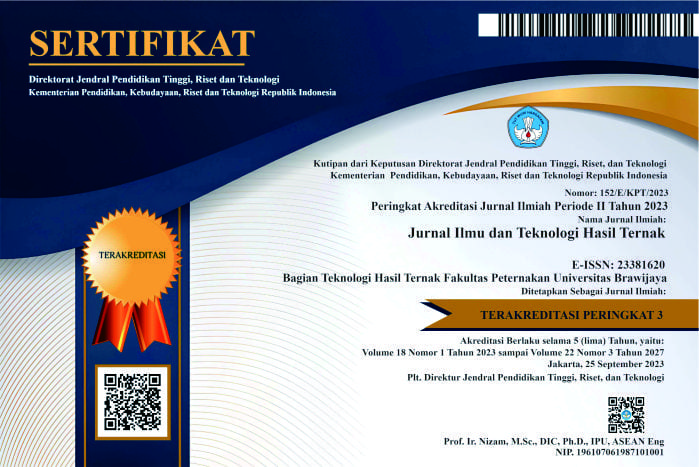Physical and Chemical Characteristics of Goat Milk Powder With Different Drying Methods After Storage
DOI:
https://doi.org/10.21776/ub.jitek.2021.016.01.7Keywords:
Cabinet dry, freeze dry, spray dry, powdered kefir, goat's milkAbstract
Processing kefir into powder form is an effort to extend shelf life, prevent contamination from unwanted bacteria, and facilitate storage. For this reason, a proper drying method is needed to produce a good quality kefir powder. There are three types of drying methods used in this study, namely drying with a cabinet dryer, freeze dryer, and spray dryer. The purpose of this study was to determine the effect of different types of drying methods on pH value, solubility, viscosity, total acid, and alcohol content of goat's milk kefir powder after storage for two months. This study used a completely randomized design method with different types of drying methods, namely T1 (cabinet dryer), T2 (freeze dryer), and T3 (spray dryer). The data were analyzed using Analysis of Variance (ANOVA) with a confidence level of 95% and if it had a significant effect, it was continued with the Duncan Multiple Range Test. The results showed that the different drying methods did not show any significant effect (p > 0.05) on the pH value, solubility, viscosity, total acid, and alcohol content, so it could be concluded that the three types of drying methods did not affect physical and chemical quality of kefir powder that has been stored for two months.Downloads
Published
2021-03-15
Issue
Section
Articles
License
Copyright (c) 2021 Heni Rizqiati, Nurwantoro Nurwantoro, Siti Susanti, Andi Febrisiantosa, Triana Setyawardani, Claradhita Ayu Shauma

This work is licensed under a Creative Commons Attribution-NonCommercial 4.0 International License.
Authors who publish with this journal agree to the following terms:
- Authors retain copyright and grant the journal right of first publication with the work simultaneously licensed under a Creative Commons Attribution License that allows others to share the work with an acknowledgement of the work's authorship and initial publication in this journal.
- Authors are able to enter into separate, additional contractual arrangements for the non-exclusive distribution of the journal's published version of the work (e.g., post it to an institutional repository or publish it in a book), with an acknowledgement of its initial publication in this journal.
- Authors are permitted and encouraged to post their work online (e.g., in institutional repositories or on their website) prior to and during the submission process, as it can lead to productive exchanges, as well as earlier and greater citation of published work (See The Effect of Open Access).















